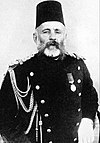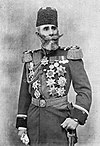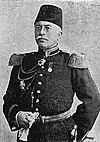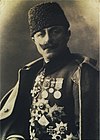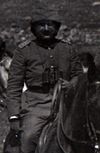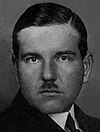
The Pour le Mérite is an order of merit established in 1740 by King Frederick II of Prussia. The Pour le Mérite was awarded as both a military and civil honour and ranked, along with the Order of the Black Eagle, the Order of the Red Eagle and the House Order of Hohenzollern, among the highest orders of merit in the Kingdom of Prussia. The order of merit was the highest royal Prussian order of bravery for officers of all ranks.

The German General Staff, originally the Prussian General Staff and officially the Great General Staff, was a full-time body at the head of the Prussian Army and later, the German Army, responsible for the continuous study of all aspects of war, and for drawing up and reviewing plans for mobilization or campaign. It existed unofficially from 1806, and was formally established by law in 1814, the first general staff in existence. It was distinguished by the formal selection of its officers by intelligence and proven merit rather than patronage or wealth, and by the exhaustive and rigorously structured training which its staff officers undertook.

Helmuth Karl Bernhard Graf von Moltke was a Prussian field marshal. The chief of staff of the Prussian Army for thirty years, he is regarded as the creator of a new, more modern method of directing armies in the field and one of the finest military minds of his generation. He commanded troops in Europe and the Middle East, in the Second Schleswig War, Austro-Prussian War and Franco-Prussian War. He is described as embodying "Prussian military organization and tactical genius". He was fascinated with railways and pioneered their military use. He is often referred to as Moltke the Elder to distinguish him from his nephew Helmuth von Moltke the Younger, who commanded the German Army at the outbreak of the First World War.

Helmuth Johannes Ludwig Graf von Moltke, also known as Moltke the Younger, was a German general and Chief of the Great German General Staff, a member of the House of Moltke. He was also the nephew of GeneralfeldmarschallGraf Helmuth Karl Bernhard von Moltke, who is commonly called "Moltke the Elder" to differentiate the two.
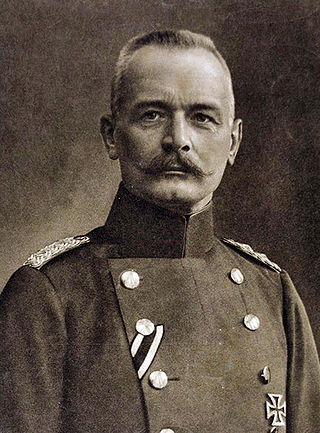
General Erich Georg Sebastian Anton von Falkenhayn was the second Chief of the German General Staff of the First World War from September 1914 until 29 August 1916. Falkenhayn was removed on 29 August 1916 after the failure of his offensive strategy in the west at the Battle of Verdun, the opening of the Battle of the Somme, the Brusilov Offensive and the Romanian entry into the war. Having planned to win the war before 1917, the German army was reduced to hanging on.

Otto Viktor Karl Liman von Sanders was an Imperial German Army general who served as a military adviser to the Ottoman Army during the First World War. In 1918 he commanded an Ottoman army during the Sinai and Palestine Campaign. On the whole Sanders provided only limited help to the Ottoman forces.

Wilhelm Leopold Colmar Freiherr von der Goltz, also known as Goltz Pasha, was a Prussian field marshal and military writer.
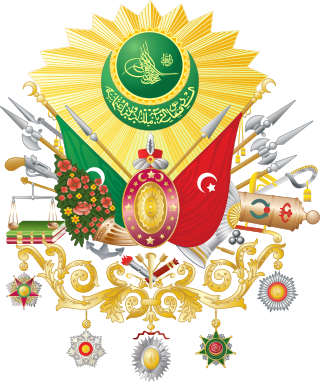
The dissolution of the Ottoman Empire (1908–1922) was a period of history of the Ottoman Empire beginning with the Young Turk Revolution and ultimately ending with the empire's dissolution and the founding of the modern state of Turkey.
Bosporus Germans is the nickname given to ethnic Germans who were living in Istanbul from the second half of the 19th century.

Friedrich Siegmund Georg Freiherr Kress von Kressenstein was a German general from Nuremberg. He was a member of the group of German officers who assisted in the direction of the Ottoman Army during World War I. Kress von Kressenstein was part of the military mission of Otto Liman von Sanders to the Ottoman Empire, which arrived shortly before World War I broke out. He was also the main leader for the Ottoman Desert Command Force (DCF).
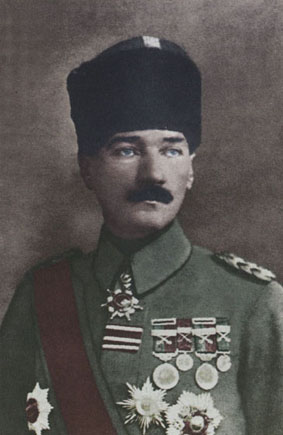
Mustafa Kemal Atatürk was a field marshal, revolutionary statesman, and founder of the Republic of Turkey as well as its first president. Mustafa Kemal Atatürk's military career explains his life between graduation from Ottoman War College in Istanbul as a lieutenant in 1905 to his resignation from the Ottoman Army on 8 July 1919, as well as his military leadership throughout the subsequent Turkish War of Independence.
Pasha was a higher rank in the Ottoman political and military system, typically granted to governors, generals, dignitaries, and others. Pasha was also one of the highest titles in the 20th-century Kingdom of Egypt and it was also used in Morocco in the 20th century, where it denoted a regional official or governor of a district.
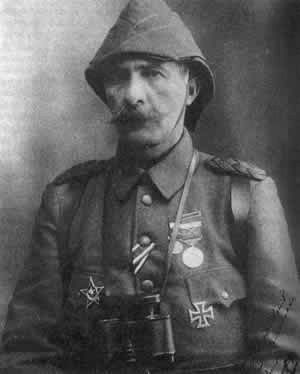
Mehmet Esat Bülkat was an Ottoman Army officer who fought during the First Balkan War, where he led the Yanya Corps, and in World War I, where he served as a senior commander in the Gallipoli campaign. Prior to the 1934 Surname Law, he was known as Mehmed Esad Pasha.

Letters on Conditions and Events in Turkey in the Years 1835-1839 or Letters from Turkey for short, is the name given to the series of letters written by Helmuth von Moltke during his stay in the Ottoman Empire between 1835 and 1839.

The Ottoman Army was the army of the Ottoman Empire after the country was reorganized along modern western European lines during the Tanzimat modernization period. It operated during the decline and dissolution of the empire, which roughly occurred between 1861 and 1918, the end of World War I for the Ottomans. The Crimean War was the first war effort in which the modern army took part in, proving itself as a decent force. The last reorganization occurred during the Second Constitutional Era.

The Ottoman Empire's entry into World War I began when two recently purchased ships of its navy, which were still crewed by German sailors and commanded by their German admiral, carried out the Black Sea Raid, a surprise attack against Russian ports, on 29 October 1914. Russia replied by declaring war on 1 November 1914. Russia's allies, Britain and France, declared war on the Ottoman Empire on 5 November 1914. The reasons for the Ottoman action were not immediately clear. The Ottoman government had declared neutrality in the recently started war, and negotiations with both sides were underway.

Erich Prigge (1878–1955) was a German army officer, who served in both the German Imperial Army and the Ottoman Army during World War I, and ultimately attained the rank of major. Prigge is best known as the long-serving adjutant to Marshal Otto Liman von Sanders (1914–19) and as a military memoirist.

During World War I, Imperial Germany was a military ally of the Ottoman Empire, which perpetrated the Armenian genocide. Many Germans present in eastern and southern Anatolia witnessed the genocide, but censorship and self-censorship hampered these reports, while German newspapers reported Turkish denial of the massacres. About 800 Imperial German Army officers and 25.000 German soldiers were an integral part of the Turkish army and belonged to its command and general staff. It is known that individual German military advisors signed some of the orders that led to deportations of Armenians. Although many individual German people tried to publicize the Armenians' fate in defiance of wartime censorship or to save as many lives as possible, the German Foreign Office and Ministry of War have both been harshly criticized for "extreme moral indifference" to the plight of Armenians and not doing more to stop the genocide. In 2016, the Bundestag apologized for Germany's "inglorious role" in a resolution recognizing the genocide.

The Battle of Longeau, was a battle of the Franco-Prussian War on December 16, 1870 in Longeau-Percey, near Dijon, France. The fighting lasted about three hours, and ended in a French retreat. Victory went to the Prussian Infantry Brigade under Colmar Freiherr von der Goltz and the German XIV Corps infantry under the command of Lieutenant General August von Werder, over French troops commanded by General Pierre Arbellot de Vacqueur, semt from Langres to Longeau. The French suffered significant losses of both manpower and equipment.

